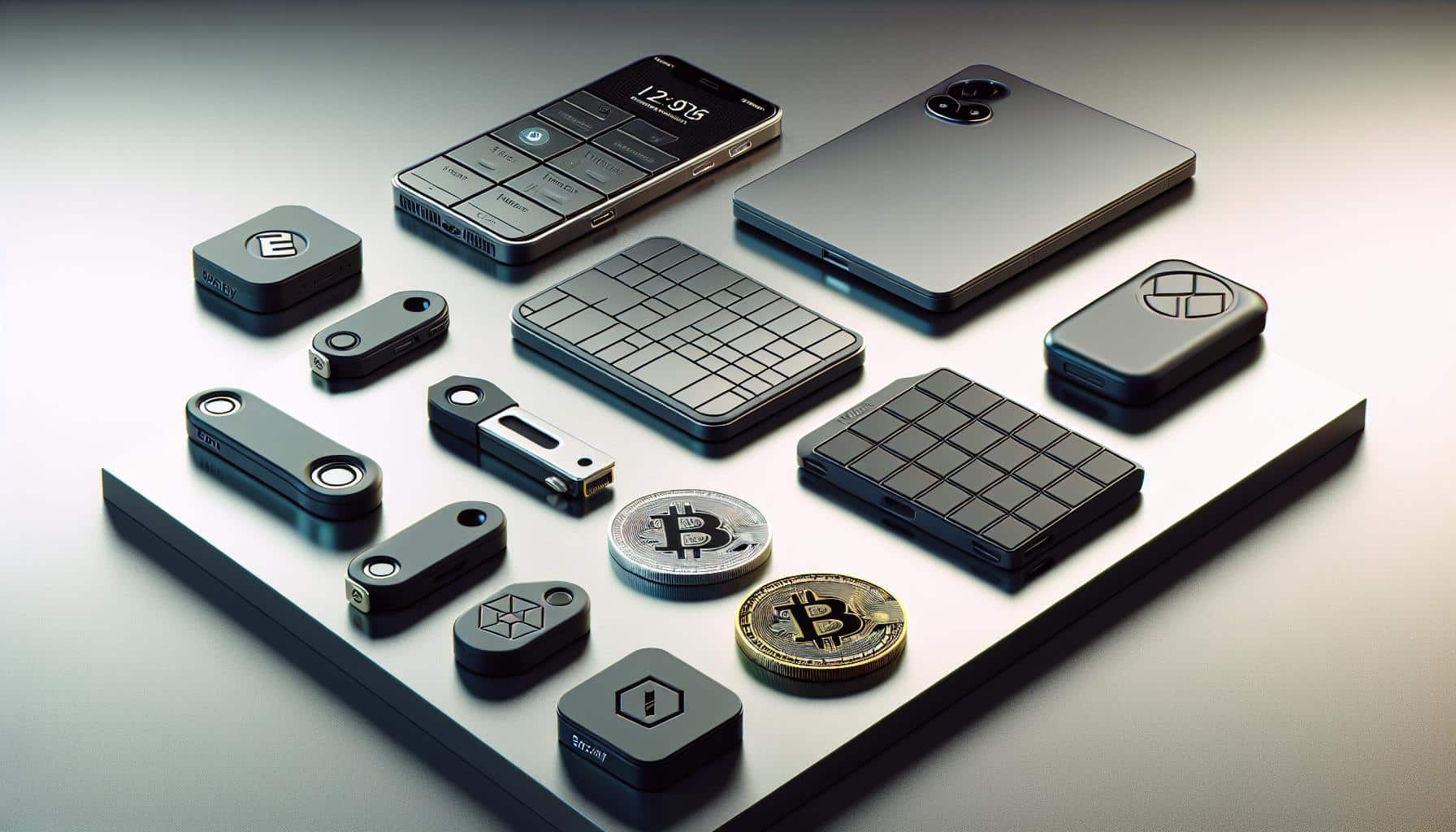Safeguard Your Crypto: Top Hardware Wallets 2022
If you’re serious about securing your cryptocurrency investments, you’ve probably heard about crypto hardware wallets. These physical devices offer a robust level of protection for your digital assets, keeping them safe from online threats. With the rise of cyber attacks and hacking incidents targeting crypto holders, having a hardware wallet is becoming increasingly essential.
Imagine having full control over your private keys, stored offline in a tamper-proof device that you can carry with you wherever you go. That’s the power of crypto hardware wallets. Whether you’re a seasoned crypto enthusiast or just starting in the world of digital currencies, understanding the importance of safeguarding your funds is crucial. In this article, we’ll delve deeper into the world of crypto hardware wallets and why they are a must-have tool for any serious crypto investor.
The Importance of Crypto Hardware Wallets
Protecting your digital assets in the competitive digital world of cryptocurrencies is crucial. One of the most secure ways to safeguard your investments is by using a crypto hardware wallet. These physical devices play a vital role in ensuring the security of your crypto holdings. Here’s why crypto hardware wallets are essential for anyone involved in crypto asset management:
- Secure Private Keys: Hardware wallets store your private keys offline, away from potential online threats like hacking and phishing attacks. By keeping your keys in a tamper-proof device, you ensure that only you have access to your digital currency.
- Protection from Cyber Attacks: With the rise of cyber threats targeting cryptocurrency holders, using a hardware wallet provides an added layer of security. It shields your assets from malicious activities that could compromise your funds.
- Risk Mitigation: Hardware wallets offer a safe way to manage your digital currency portfolios, reducing the risk of unauthorized access and theft. By having control over your private keys offline, you minimize the chances of losing your investments.
- User-Friendly: Despite their high level of security, crypto hardware wallets are designed to be user-friendly, making them accessible to both experienced crypto enthusiasts and newcomers. Their straightforward setup and operation make them a convenient choice for securing your crypto assets.
- Peace of Mind: By entrusting your digital assets to a hardware wallet, you gain peace of mind knowing that your investments are secure. Whether you’re actively trading in the digital currency market or holding cryptocurrencies for the long term, a hardware wallet provides a reliable storage solution.
In today’s ever-evolving crypto landscape, safeguarding your digital assets is essential. By utilizing a crypto hardware wallet, you can protect your holdings from online threats and ensure the security of your investments. Whether you’re managing a diverse altcoin portfolio, engaging in DeFi token swapping, or participating in crypto mining, a hardware wallet is a valuable tool for securing your cryptocurrency assets.
Types of Crypto Hardware Wallets

When it comes to safeguarding your digital assets, there are different types of crypto hardware wallets available in the market. These physical devices offer an added layer of security by storing your private keys offline, making it harder for hackers to access your funds. Here are the common types of crypto hardware wallets you can consider:
- USB Hardware Wallets
- These wallets are similar in appearance to a USB stick and can be connected to your computer when you need to make a transaction. They are portable and convenient for storing a variety of cryptocurrencies securely.
- Smart Card Hardware Wallets
- Smart card wallets resemble a credit card and require the insertion into a card reader for use. They are known for their ease of use and offer additional security features like PIN protection.
- Offline Hardware Wallets
- These wallets operate without an internet connection, reducing the risk of online attacks. They are ideal for holding large amounts of cryptocurrency for long-term storage.
- Paper Wallets
- A paper wallet is a physical document that contains your private and public keys. It’s considered one of the most secure ways to store cryptocurrency as it’s entirely offline. However, it’s essential to keep the paper safe from damage and theft.
- Steel Wallets
- Steel wallets involve engraving your private keys onto a metal plate. This method ensures durability and protection against physical damage or degradation over time.
By choosing the right type of crypto hardware wallet based on your preferences and security needs, you can confidently store your digital assets offline, minimizing the risk of unauthorized access or cyber theft. Remember to always backup your wallet and keep it in a secure location to ensure the safety of your cryptocurrency investments.
Key Factors to Consider When Choosing a Crypto Hardware Wallet
When selecting a crypto hardware wallet, there are several crucial factors to bear in mind to ensure the security and accessibility of your digital assets. Here are essential considerations to help you make an informed decision:
Security Features
- Secure Private Keys: Look for a hardware wallet that provides robust protection for your private keys, ensuring they are stored offline to minimize the risk of unauthorized access.
- Multi-Signature Security: Opt for a wallet that offers multi-signature functionality for additional security layers, requiring multiple approvals for transactions.
- Hot/Cold Wallet Storage: Consider a wallet that supports both hot and cold storage options, allowing you to store a portion of your assets offline for enhanced security.
Usability and Compatibility
- User-Friendly Interface: Choose a hardware wallet with an intuitive interface that simplifies the process of managing your digital assets and executing transactions.
- Cross-Chain Compatibility: Ensure that the wallet supports a wide range of cryptocurrencies and is compatible with various blockchains to accommodate your diverse portfolio.
Backup and Recovery Options
- Seed Phrase Backup: Select a wallet that enables you to generate a secure seed phrase for backup purposes, allowing you to restore access to your funds if the wallet is lost or damaged.
- Recovery Options: Look for wallets that provide reliable recovery mechanisms, such as passphrase recovery or seed phrase verification, to regain access to your assets in case of emergencies.
- Firmware Updates: Choose a hardware wallet that regularly updates its firmware to address security vulnerabilities and enhance the overall functionality of the device.
- Customer Support: Prioritize wallets that offer responsive customer support services to assist you in case of technical issues or queries about the device.
By considering these key factors when selecting a crypto hardware wallet, you can safeguard your digital assets effectively and manage your cryptocurrency portfolio with confidence.
How to Set Up and Use a Crypto Hardware Wallet
When it comes to ensuring the security of your digital assets, setting up and using a crypto hardware wallet is crucial. Here’s a step-by-step guide to help you efficiently set up and utilize your crypto hardware wallet:
1. Initial Setup
- Unboxing Your Hardware Wallet: Start by unboxing your crypto hardware wallet and ensure that all the contents are included.
- Connecting to a Secure Device: Connect your hardware wallet to a secure device, like a computer or smartphone, using the provided USB cable.
- Creating a Strong PIN: Set up a strong PIN code to secure access to your hardware wallet.
- Generating a Recovery Seed: Your wallet will generate a recovery seed consisting of 12-24 words. Write this seed down and store it securely offline.
2. Installing Wallet Software
- Download the Official Wallet Software: Visit the official website of the hardware wallet manufacturer and download the appropriate wallet software for your device.
- Installing Firmware Updates: Ensure your hardware wallet has the latest firmware updates installed for enhanced security.
3. Accessing Your Wallet
- Entering Your PIN: Enter your PIN on the hardware wallet to unlock it.
- Managing Cryptocurrencies: Use the wallet software to manage different cryptocurrencies supported by your hardware wallet.
- Sending and Receiving Funds: Send or receive funds by following the instructions provided on the wallet interface.
- Verifying Transactions: Always verify transactions on both the hardware wallet and the connected device before confirming them.
- Secure Storage: Store your hardware wallet in a safe place to prevent theft or damage.
- Backup Your Seed: Regularly backup and store your seed phrase in a secure location.
- Avoid Phishing Attacks: Be cautious of phishing attempts and never share your recovery seed or private keys.
- Enable Additional Security Features: Utilize any additional security features provided by your hardware wallet for added protection.
By following these steps and best practices, you can securely set up and use your crypto hardware wallet to safeguard your digital assets effectively. Remember to stay informed about the latest security measures to protect your investments in the ever-evolving world of cryptocurrency.
Top Crypto Hardware Wallets in the Market
When it comes to securing your cryptocurrency investments, hardware wallets are a popular choice due to their offline storage of private keys, offering protection against cyber threats and minimizing risks. Here are some of the top crypto hardware wallets currently available in the market:
1. Ledger Nano S
The Ledger Nano S is a compact and secure hardware wallet that supports a wide range of cryptocurrencies, including Bitcoin, Ethereum, and many others. Its robust security features, such as a secure element chip and PIN code, make it a top choice for enthusiasts looking to safeguard their digital assets.
2. Trezor Model T
Trezor Model T is another reputable hardware wallet known for its user-friendly interface and advanced security features. With a touchscreen display and passphrase protection, it offers a high level of protection against unauthorized access and ensures a seamless user experience.
3. KeepKey
KeepKey is a sleek hardware wallet that stands out for its large display and intuitive design. It supports over 40 cryptocurrencies and tokens, making it a versatile option for managing various digital assets securely. Its integration with the ShapeShift exchange platform simplifies crypto trading for users.
4. BitBox02
For those looking for a minimalist yet powerful hardware wallet, BitBox02 is a compelling choice. It emphasizes security and privacy, incorporating features like a unique touch slider for transaction confirmation and compatibility with popular wallets like Electrum and MyEtherWallet.
5. SecuX V20
SecuX V20 is a premium hardware wallet with a focus on usability and security. Its anti-tamper design and military-grade Secure Element chip provide users with peace of mind when storing and managing their cryptocurrencies. It supports a wide range of coins and tokens, making it versatile for diverse portfolios.
By choosing one of these top crypto hardware wallets, you can enhance the security of your digital assets and navigate the crypto landscape with confidence. Remember to research each option thoroughly to find the best fit for your needs.
Conclusion
You’ve now explored the realm of crypto hardware wallets, essential tools for safeguarding your cryptocurrency investments offline. By opting for a top hardware wallet like Ledger Nano S, Trezor Model T, KeepKey, BitBox02, or SecuX V20, you’re prioritizing security and ease of use. These devices offer robust protection against cyber threats and support various cryptocurrencies, empowering you to navigate the dynamic crypto landscape with confidence. With features designed to enhance asset security and user experience, these wallets are your gateway to secure and seamless management of digital assets. Make the smart choice and elevate your crypto investment strategy with a reliable hardware wallet.
Frequently Asked Questions
What are crypto hardware wallets and why are they important?
Crypto hardware wallets are physical devices that store private keys offline, providing enhanced security for cryptocurrency holdings. They are crucial for safeguarding assets against online threats and hacks.
What factors should be considered when choosing a crypto hardware wallet?
Key factors to consider include security features, supported cryptocurrencies, user interface, compatibility with devices, backup options, reputation of the manufacturer, and ongoing support.
What are some of the top crypto hardware wallets available in the market?
Top crypto hardware wallets include Ledger Nano S, Trezor Model T, KeepKey, BitBox02, and SecuX V20. These wallets offer advanced security features, easy-to-use interfaces, and support for a wide range of cryptocurrencies.
How do these top crypto hardware wallets enhance asset protection and user experience?
These hardware wallets offer robust security measures like secure chip technology, encrypted storage, two-factor authentication, and firmware updates to protect assets. They also provide convenient interfaces for managing and accessing cryptocurrencies easily.







 Bitcoin
Bitcoin  Ethereum
Ethereum  Tether
Tether  XRP
XRP  USDC
USDC  Solana
Solana  TRON
TRON  Lido Staked Ether
Lido Staked Ether  Figure Heloc
Figure Heloc  Dogecoin
Dogecoin  WhiteBIT Coin
WhiteBIT Coin  USDS
USDS  Cardano
Cardano  Bitcoin Cash
Bitcoin Cash  Wrapped stETH
Wrapped stETH  LEO Token
LEO Token  Hyperliquid
Hyperliquid  Wrapped Bitcoin
Wrapped Bitcoin  Monero
Monero  Binance Bridged USDT (BNB Smart Chain)
Binance Bridged USDT (BNB Smart Chain)  Chainlink
Chainlink  Ethena USDe
Ethena USDe  Canton
Canton  Stellar
Stellar  Wrapped eETH
Wrapped eETH  USD1
USD1  Rain
Rain  sUSDS
sUSDS  PayPal USD
PayPal USD  Dai
Dai  Hedera
Hedera  Coinbase Wrapped BTC
Coinbase Wrapped BTC  Litecoin
Litecoin  Avalanche
Avalanche  Zcash
Zcash  WETH
WETH  Sui
Sui  Shiba Inu
Shiba Inu  Cronos
Cronos  USDT0
USDT0  Tether Gold
Tether Gold  Toncoin
Toncoin  World Liberty Financial
World Liberty Financial  MemeCore
MemeCore  PAX Gold
PAX Gold  Polkadot
Polkadot  Uniswap
Uniswap  Ethena Staked USDe
Ethena Staked USDe